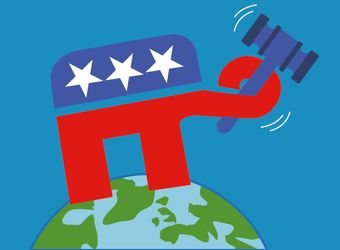The world has darkened. The prospect of a democratically elected convicted felon becoming the world’s most powerful man says more about US democracy than the felon. Across the world, menacing thunderclouds are gathering with ordinary people, the planet and popular democracies undergoing unprecedented stress. It is like the absurd Hollywood comedy-drama—Everything Everywhere All At Once. It is absurd and dramatic, but there is nothing comic about what’s going on in the world.
While people focused on Donald Trump, Gaza or Indian elections, NATO authorised Ukraine’s use of their—including American and German—weapons to attack Russia’s Kharkiv territory. Until now, their weapons could be used only in defence within Ukraine. NATO’s policy shift aims to bolster Ukraine’s flagging war efforts, but it risks inviting Russian retaliatory attacks, imperilling 550 million Europeans. The European governments are already asking their citizens to stock up emergency supplies like drinking water, candles, batteries, matches, cash and dry rations.
Russia and NATO members—the US, Britain and France—have nuclear weapons. But there is no looming threat of nuclear war. The quantity of items required to be stocked suggest European authorities are preparing instead for a Russian hybrid response—attacks on communication lines, water supplies, banking systems or electricity grids, disruptions that can be repaired in a few days. But as American historian Barbara Tuchman warned: “War is the unfolding of miscalculations.”
Away from Europe, the danger of confrontation between China and the US over Taiwan persists. Now the Philippines—a US ally—threatens war if China kills even one Filipino in their ongoing clashes over disputed maritime territories. The China-US relations are brittle. If the US is hyper, demanding immediate attention, then China is passive-aggressive. When China is furious, it doesn’t rant, it chooses radio silence, ignoring US calls. Said American journalist David E. Sanger, “China’s silence drives US crazy.”
War is extreme and appears distant to citizens until they hear rockets and warplanes. The first sign that the New York jury’s verdict (which Indians noted was delivered at 4:20pm) had gone against Trump was the vigil of whirring helicopters overhead, scanning for trouble. Optimists say even after the darkest night, dawn breaks; there is always light at the end of the tunnel: economic growth in China, peace in Gaza, ceasefire between Republicans and Democrats.
Trump’s conviction is a triumph of America’s fearless, independent judiciary. But the opposite is equally true—a Trump-appointed judge has delayed ruling on his immunity from prosecution for acts committed as president. Besides, all Trump cases can be overturned by his appointees in the Supreme Court. The New York court showed no man is above law in the US. But the “people’s court” can resurrect Trump when they vote in November. The US presidential historian Alexis Coe noted, “One big difference between the Richard Nixon and Trump situations is that American voters demanded accountability from Nixon.” Polarisation has wrecked that consensus.
So, the felon’s fate is far from sealed. If Trump wins, a lawbreaker becomes the chief law enforcement officer and commander-in-chief of the world’s mightiest nation. As president, he vows to ignite the “rites of retribution”, wreaking havoc on American systems, institutions, opponents and whistleblowers. Violence can erupt. All options are on the table, and it is not a banquet. Compulsive optimists should keep in mind Murphy’s Law—“the light at the end of the tunnel can be the headlamp of an oncoming train.”
Pratap is an author and journalist.


